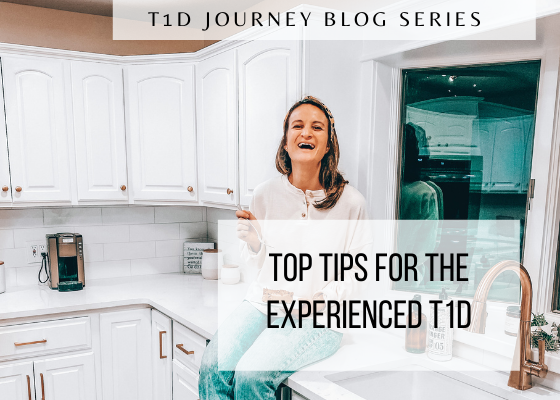Do you remember being a senior in high school? You were the seasoned student, no longer getting lost in the hallways or uncertain about where to sit at lunch. You knew your way around, what you could get away with, and you might have been a little bit bored. You weren’t in a hurry to change anything, but deep down you wondered if life after graduation would be better.
When you’ve had type 1 diabetes for 2 or more years, it’s like being a perpetual senior in high school:
You know your way around and what you can get away with when it comes to food and insulin. You may be susceptible to burn out. You might not change your rates or settings very often. You still wonder if things could be better.
While you don’t have the same challenges you had when you were first diagnosed or learning to manage your T1D independently, it doesn’t exactly feel like it’s easy either. You’ve been living with the same A1C and time-in-range (and quite possibly, the exact same insulin rates and ratios!) for years. To everyone around you, you’re “in control!” but you want to take it to the next level, lower your A1C, and maybe even feel proud of your T1D.
BODY
As an experienced T1D, you’ve seen all the charts, tried all of the technology, and heard about all of the different food and workout plans out there. But how much do you know about YOUR own body?
- Log everything: Yup, sometimes going back to the basics is the best way to advance. Try logging your blood sugars, food, insulin, activity, and stress to get a sense of your current patterns to gain more knowledge of your own body. Use that data as a starting point for applying logistical and technical strategies.
- Take action on patterns: Once you’ve refreshed your understanding of how hormones, stress, sleep, fats + proteins, and insulin timing currently impact your blood sugars, make adjustments to basal rates/long acting insulin dosage, carb ratios, or correction factors.
MIND
When you were first diagnosed, you had to learn a lot of new things like blood sugar ranges, how to count carbs, how to calculate insulin doses, and so on. Now that stuff is ingrained in your mind. Instead of feeling frustrated or tired of the same old routines, prioritize your mindset – how can you embrace that newbie mentality again?
- When you bring fresh eyes to observe your patterns and trends, you might see some things you’ve previously overlooked because it’s become so routine. Where are you settling that you could approach differently? Focus on what your outcomes can be, not what they are. Whether it’s a goal related to A1C or TIR, food freedom, or exercise, identify your mental blocks at this point in your T1D journey, create a sustainable plan that works with your lifestyle and aligns your values to keep you motivated.
- Maybe it’s not about spending more time looking at your CGM or planning your meals and workouts. Maybe what you need now as an experienced T1D is to spend more time focusing on your mindset. A great place to start: notice your internal response when your blood sugar goes out of range. If you judge yourself, “UGH how did I let that happen! I’m so dumb, I know better than this” try shifting to curiosity: “Hmm, this is so interesting. I wonder why this happened?!”
SOUL
Do you ever wake up and feel like “Ugh. I still have diabetes?” It’s normal to experience burnout at some point after having T1D for a while. This condition has just as much of a mental and emotional burden as it does a physical one. And diabetes burnout does not signify laziness, weakness, or a lack of care. So what can you do to move through the burnout blues?
- Focus on how you want to feel + choose ONE THING. If you’re stuck in a cycle of overwhelm and it’s leading you to make choices that aren’t serving you, but the thought of changing your habits is daunting, just focus on how you want to feel and pick one thing to support that. This could be drinking a glass of water when you wake up, calling a friend or family member, or taking a few minutes to stretch before bed
- You don’t need to overhaul your whole life to start feeling better. Simple action steps added together build positive momentum.
- Talk to your support system. Perhaps it feels like your loved ones assume you have diabetes figured out by now and aren’t aware that the emotional aspect of it can be challenging, no matter how experienced you are. So communicate with your partner, parents, or friends, or seek out support from the T1D community.

Lauren, your advice is invaluable to all people with T1D. Being diagnosed at 11 years old, I spent so many years trying to carry the burden of diabetes mgmt on my own shoulders. I wanted to show my family I was independent, and cried at every endocrinologist appt because I felt like I was never managing well enough. I only began to realize this detrimental mentality of mine in the last year or so, after living with diabetes for 14 years. Finding the T1D community on Instagram, and following your social media has changed my mentality towards diabetes mgmt 180 degrees. I am happy to report that I no longer experience an emotional reaction to skewed BG values, I simply see them as information and that’s it!
Hi Alana,
Keep up your good attitude and it will take you far. I was diagnosed at age 16 and I’ve lived with diabetes for 61 years with no complications. My motto is I’m a healthy person who happens to have diabetes. I now wear a pump, omnipod , and I love it. My A1C stays around 6.5
Linda